Detailed Reviews of the Top 10 Boba Tea Franchises
The Booming Bubble Tea Market: Is a Franchise Right for You?
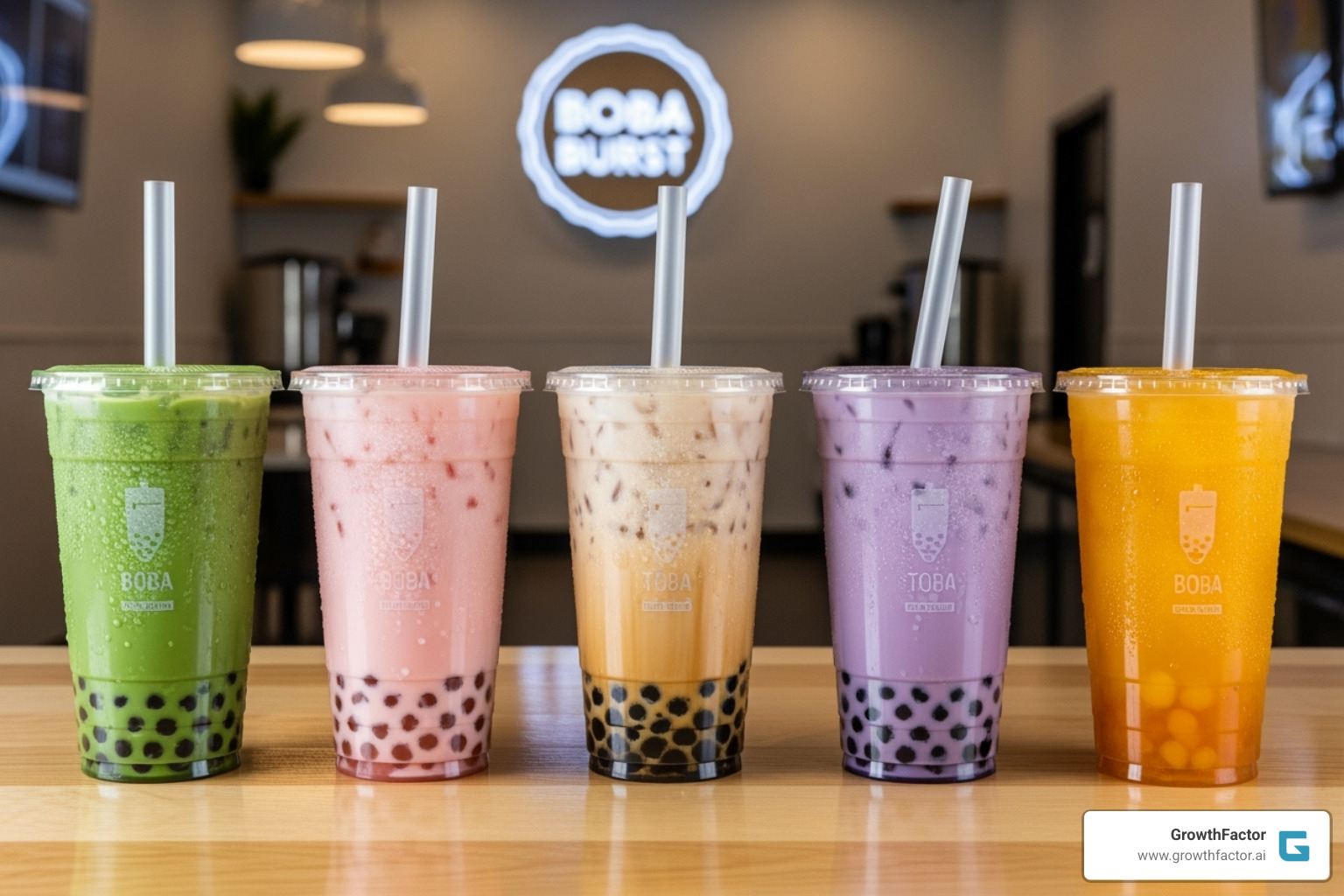
A boba tea franchise offers an opportunity to enter a rapidly growing beverage market with an established brand. The global bubble tea market was valued at $2.02 billion in 2019 and is projected to reach $3.39 billion by 2027, with over 3,300 boba shops currently operating in the United States.
Top Boba Tea Franchise Investment Ranges:
| Franchise Brand | Total Investment | Franchise Fee | Royalty Fee |
|---|---|---|---|
| Kung Fu Tea | $140k - $422k | $37k | 4% |
| Gong cha | $177k - $335k | $41.5k | 5.5% |
| Sharetea | $300k+ | Varies | Not disclosed |
| Chatime | $181k - $507k | $78k | 3.5% |
| Tapioca Express | $200k - $527k | $15k | 2.5% |
Originating in Taiwan, bubble tea has become a mainstream coffee alternative. The franchise model provides brand recognition, proven systems, and comprehensive support. Key considerations include initial investment, royalty fees, and franchisor support. The process from application to opening typically takes 3-6 months, with location selection being critical for success.
I'm Clyde Christian Anderson, founder and CEO of GrowthFactor.ai. My retail experience has proven that data-driven location decisions are vital for franchise success. At GrowthFactor, we've helped retailers analyze over 15,000 sites with a 99.8% success rate in the competitive boba tea franchise market.
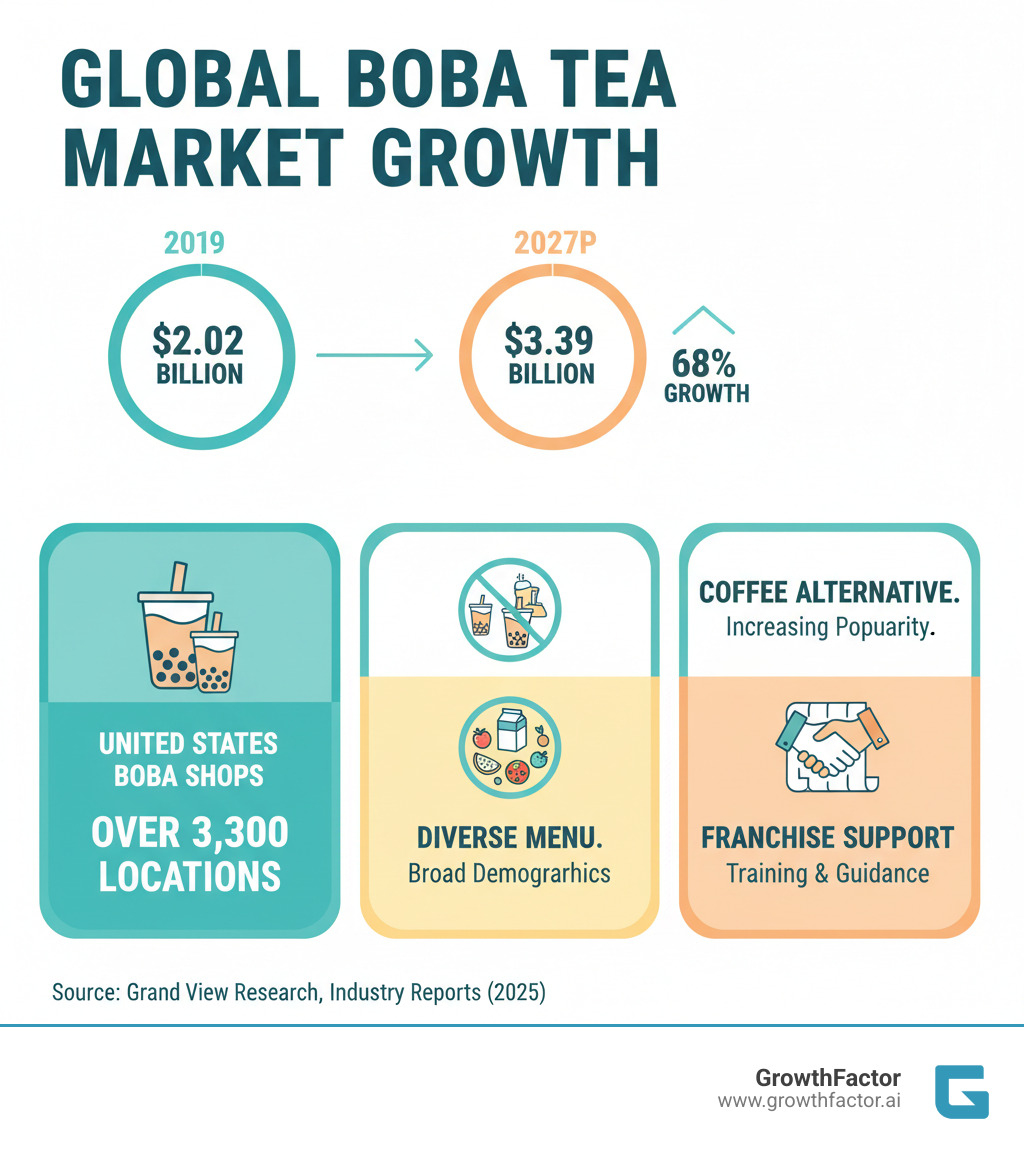
Comparing the Top 10 Boba Tea Franchise Opportunities
Deciding to invest in a boba tea franchise is a big step, and choosing the right brand is crucial. To help you steer this exciting market, we've compiled detailed reviews of ten popular and reputable boba tea franchises. For each, we'll provide a consistent set of data points, making it easier for you to compare and find the perfect fit for your entrepreneurial journey.
1. Kung Fu Tea
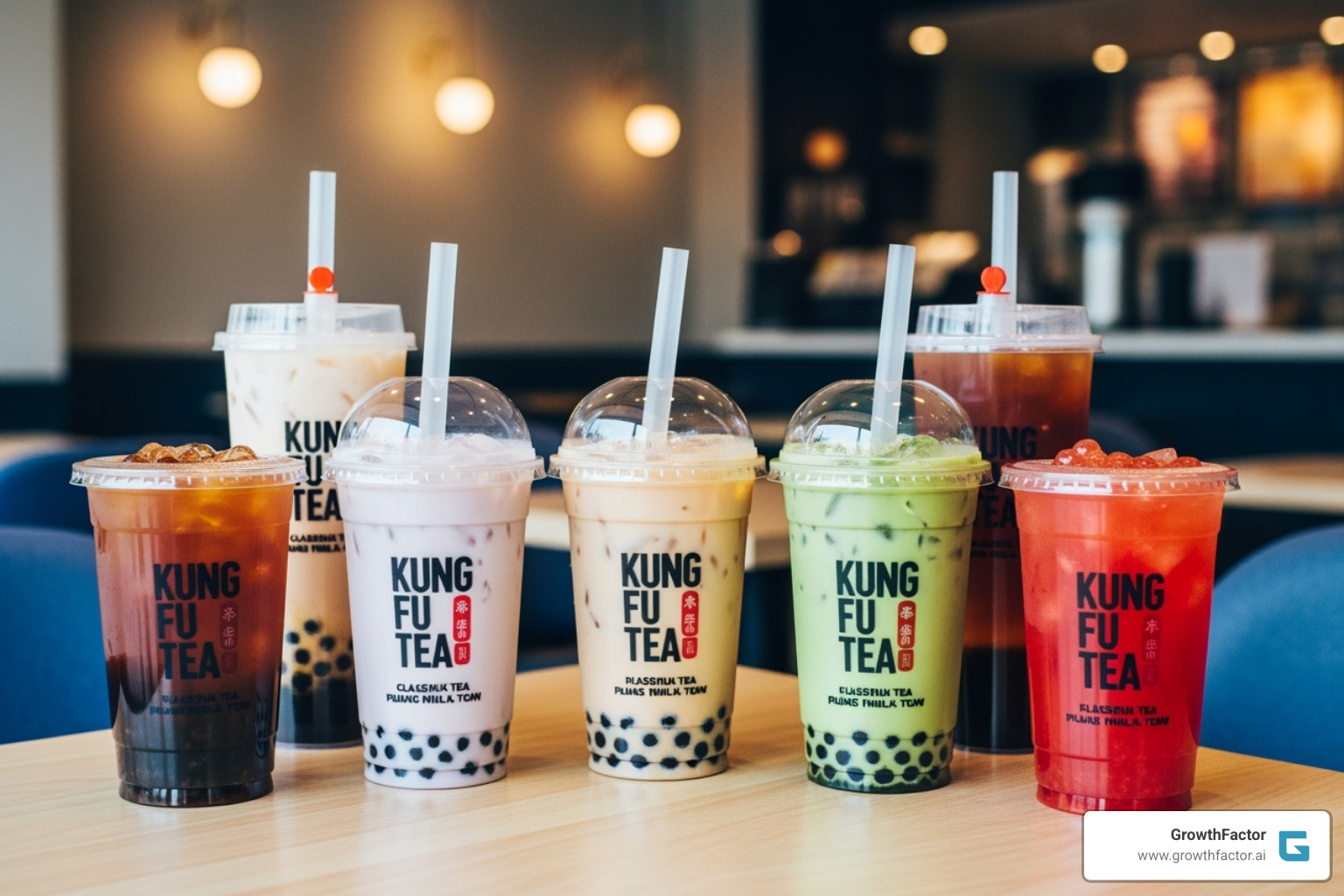
Kung Fu Tea is a major player in the American boba tea franchise market, named the #1 Bubble Tea Brand by Entrepreneur and others. With over 440 stores globally, their brand identity is Fresh, Innovative, and Fearless. They seek partners who share their passion for quality and customer experience.
The initial investment for a traditional store is $140,000 to $422,000, with a $37,000 franchise fee. The royalty fee is a competitive 4% of gross sales.
Training is a key strength. Franchisees receive two weeks of training at the KFT Academy, followed by an additional two weeks of on-site support from a Senior Trainer after the grand opening. Kung Fu Tea values enthusiasm and cultural fit, making it an accessible option for passionate first-time owners. You can learn more on their Domestic Franchising | Fresh - Innovative - Fearless leading tea brand page. Smart retail expansion planning is crucial for a brand like this.
2. Gong cha
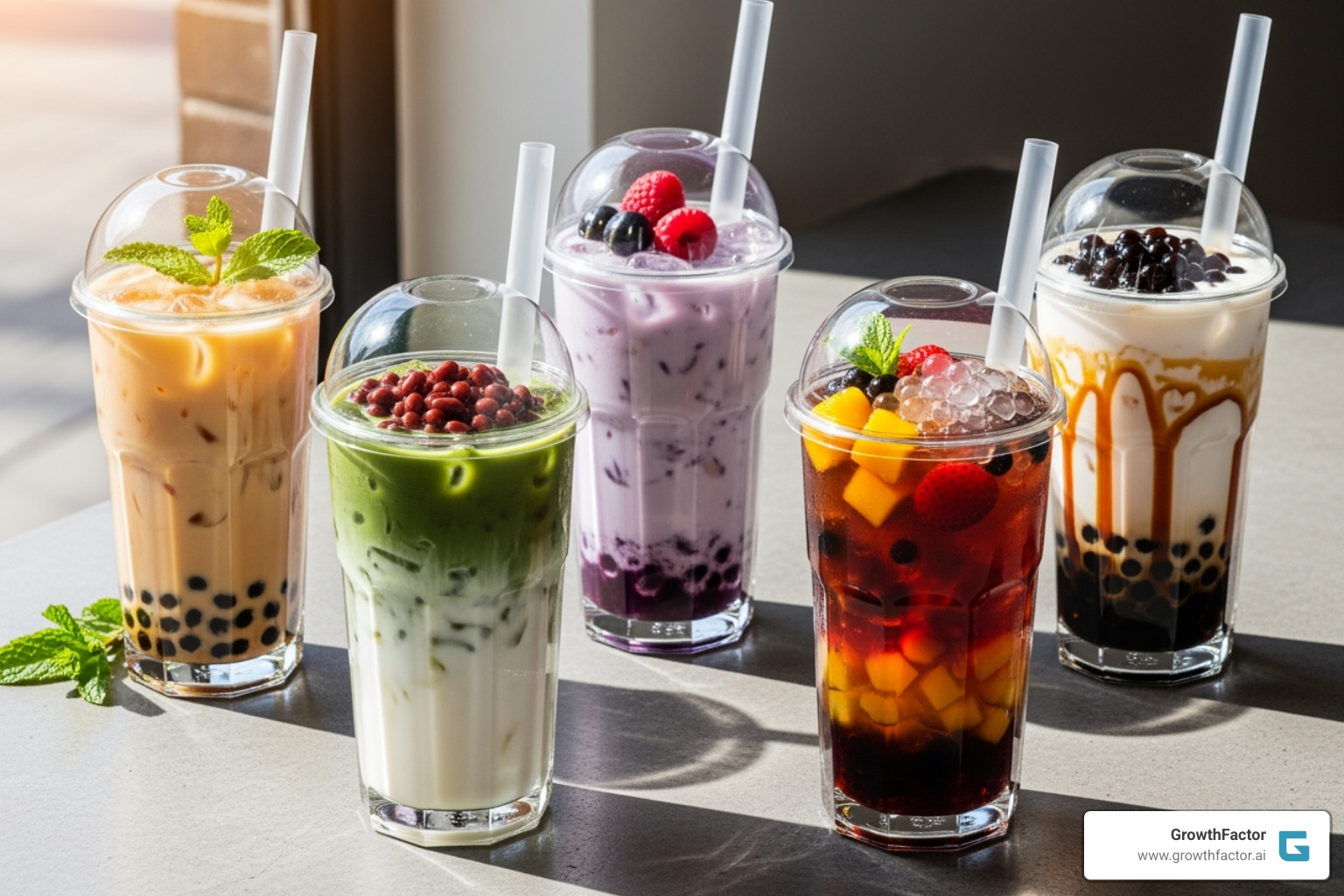
Gong cha is a global phenomenon with over 440+ locations and nearly two decades of experience. The brand's name translates to "tribute tea for the emperor," reflecting its commitment to premium quality. Their key differentiator is using freshly brewed tea, never from concentrate or powder.
The initial investment ranges from $177,430 to $335,400, with a $41,500 franchise fee and a 5.5% royalty fee. These mid-range figures align with their premium positioning. Gong cha also incorporates technology to streamline operations, from inventory to customer ordering. Their success in markets like Boston, detailed at The Best Selling Bubble Tea in Boston - Gong cha, demonstrates their strong brand recognition. Investing in Gong cha means getting a battle-tested system refined across six continents.
3. Sharetea
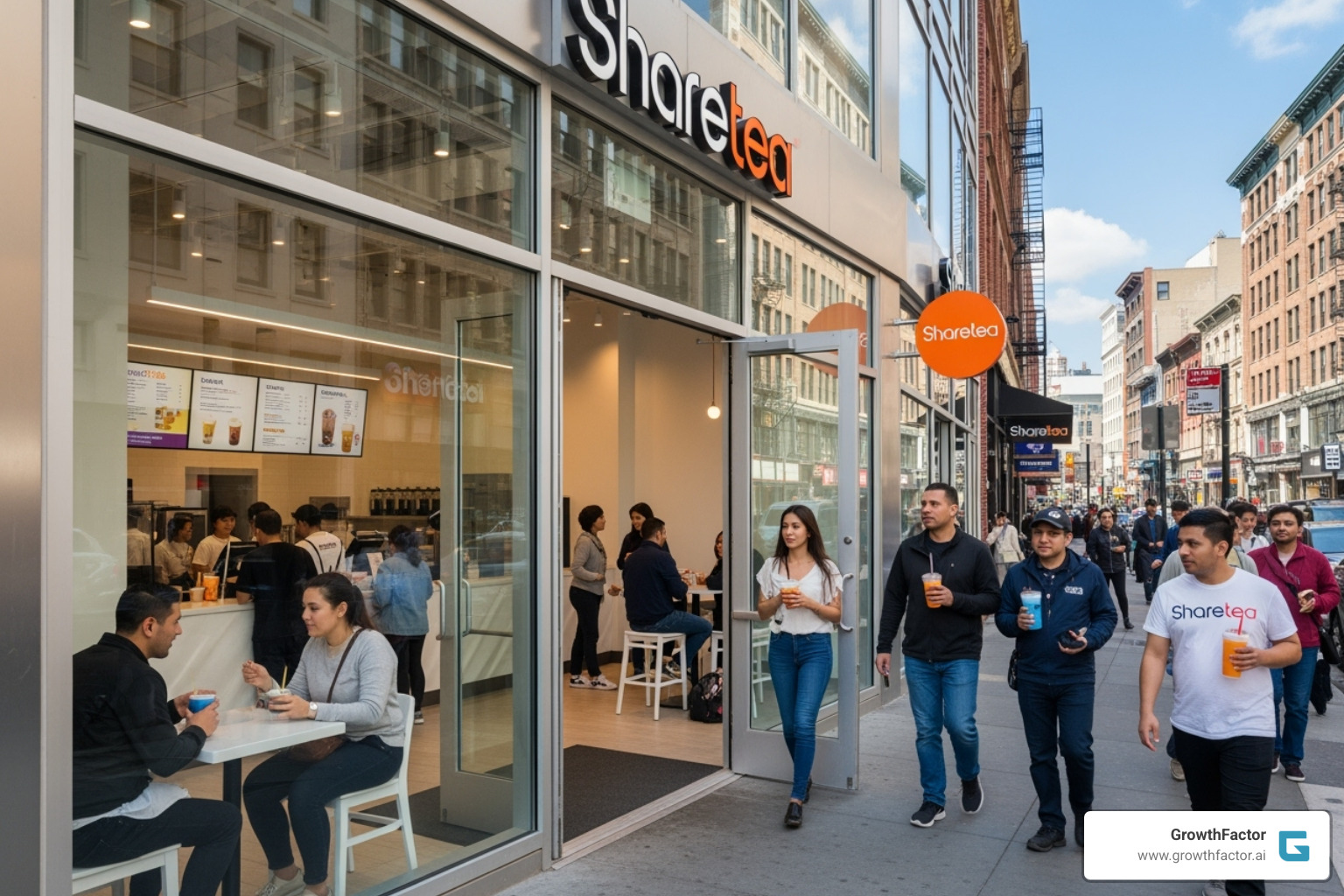
Founded in Taiwan in 1992, Sharetea brings three decades of experience to the boba tea franchise market. Their core promise is authenticity, importing tea leaves directly from Taiwan for every cup. The brand has over 400 stores in 12 countries, including more than 150 in North America.
Key Details:
The financial commitment requires a minimum total investment of $300,000 and at least $100,000 in liquid capital. The franchise fee varies. Sharetea is selective, with applications qualified by their Taiwan headquarters to maintain high standards. They also offer exclusive territorial rights, a valuable protection for franchisees. This provides access to decades of tea expertise and a refined global business model. Explore their opportunities at Boba Tea Franchise — Sharetea - Best Bubble Tea Brand. A solid market entry strategy is key to success.
4. Chatime
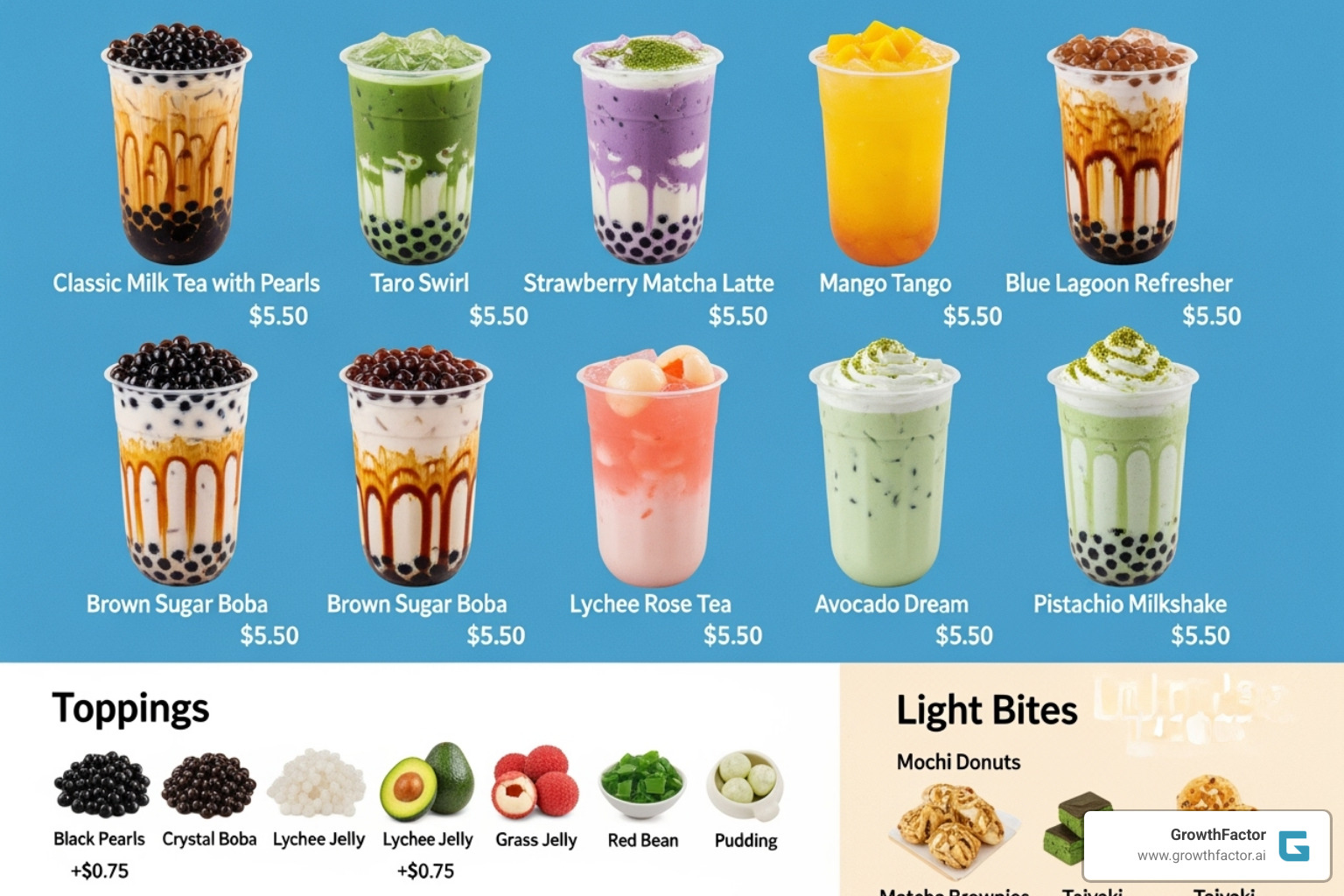
Chatime is a global powerhouse in the boba tea franchise industry, operating on six continents with over 60 units in the U.S. They focus on building resilient partnerships with entrepreneurs, a model proven by strong delivery and digital sales during challenging economic times.
The investment for a Chatime franchise ranges from $181,100 to $507,200, with a $78,000 franchise fee. Their 3.5% royalty fee is one of the lower rates among major brands, which can significantly impact long-term profitability. Franchisees receive comprehensive support, including thorough training, "game-changing marketing" resources, and best-in-class supply chain management. Chatime prides itself on product excellence and innovation, constantly refreshing its menu. Learn more about their partnership model at Home - Chatime Bubble (Boba) Tea Franchise.
5. Happy Lemon
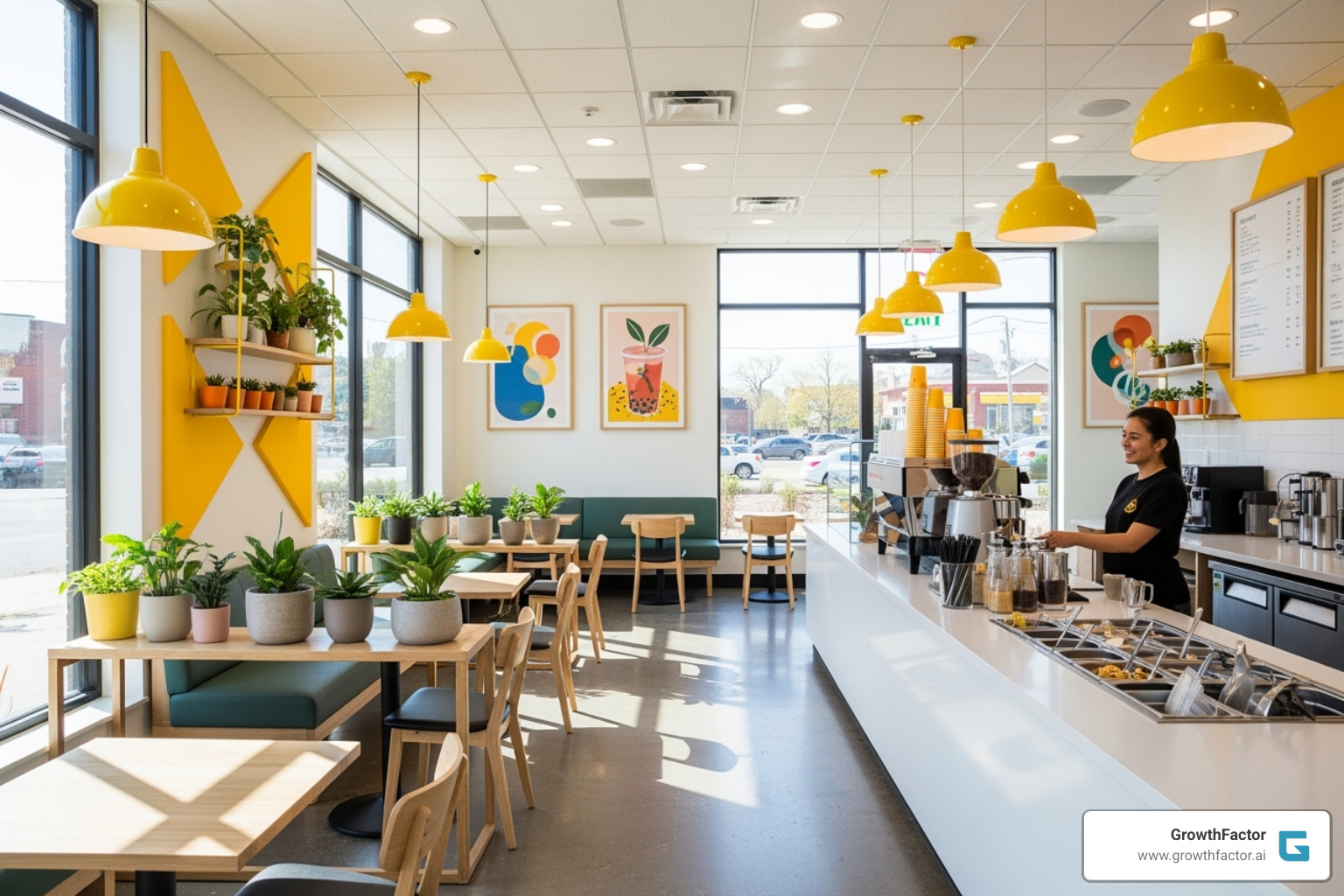
Happy Lemon stands out in the boba tea franchise world with its vibrant yellow branding and a global presence of over 1,000 stores. Their claim to fame is pioneering the rock-salted cheese topping, a creamy, salty foam that creates a unique taste experience and helps the brand stand out.
The initial investment ranges from $309,000 to $509,000, with a $40,000 franchise fee. The 7% royalty fee is among the highest in the industry, reflecting their strong brand recognition and support system. Happy Lemon's stores are designed to be bright, cheerful, and Instagram-worthy, creating built-in social media marketing. Investing in this brand means tapping into a global company's decades of experience in product development and operations.
6. Tastea
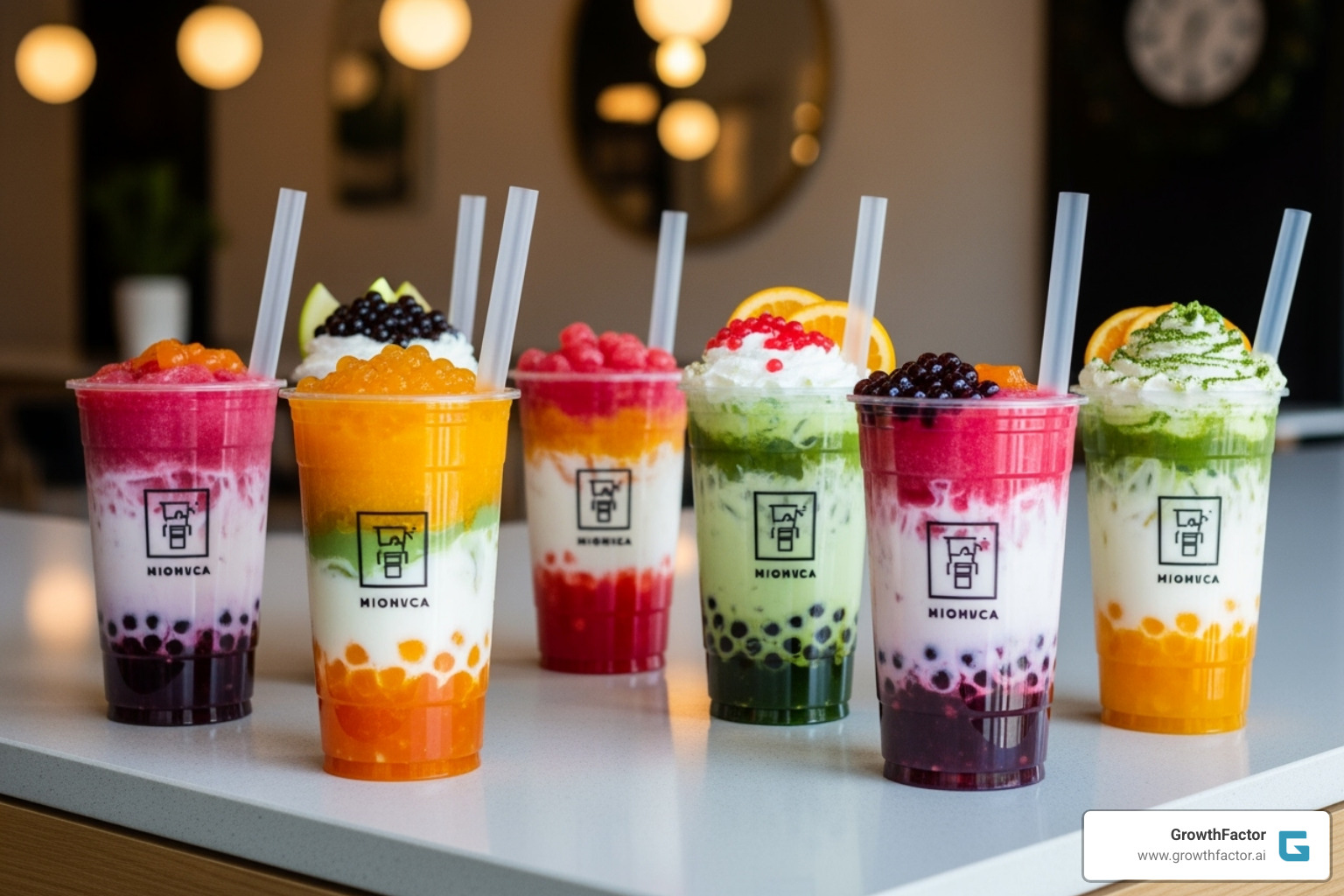
Tastea began in 2001 with a vision to blend authentic East Asian flavors with a fun, customer-focused atmosphere. Today, it has grown to 30 locations. What sets this boba tea franchise apart is its tech-forward approach. They use ordering kiosks, pick-up windows, drive-thrus, and a sophisticated loyalty app to create a seamless customer experience.
The financial requirements are a minimum of $400,000 in liquid capital. Tastea provides extensive training: two weeks at corporate locations in California, plus up to four weeks of on-site support at your new store. The multi-stage interview process ensures a strong fit between the brand and franchisee, signaling their investment in your success. For tech-reliant brands like Tastea, using retail analytics platforms is essential for optimizing operations.
7. Tapioca Express
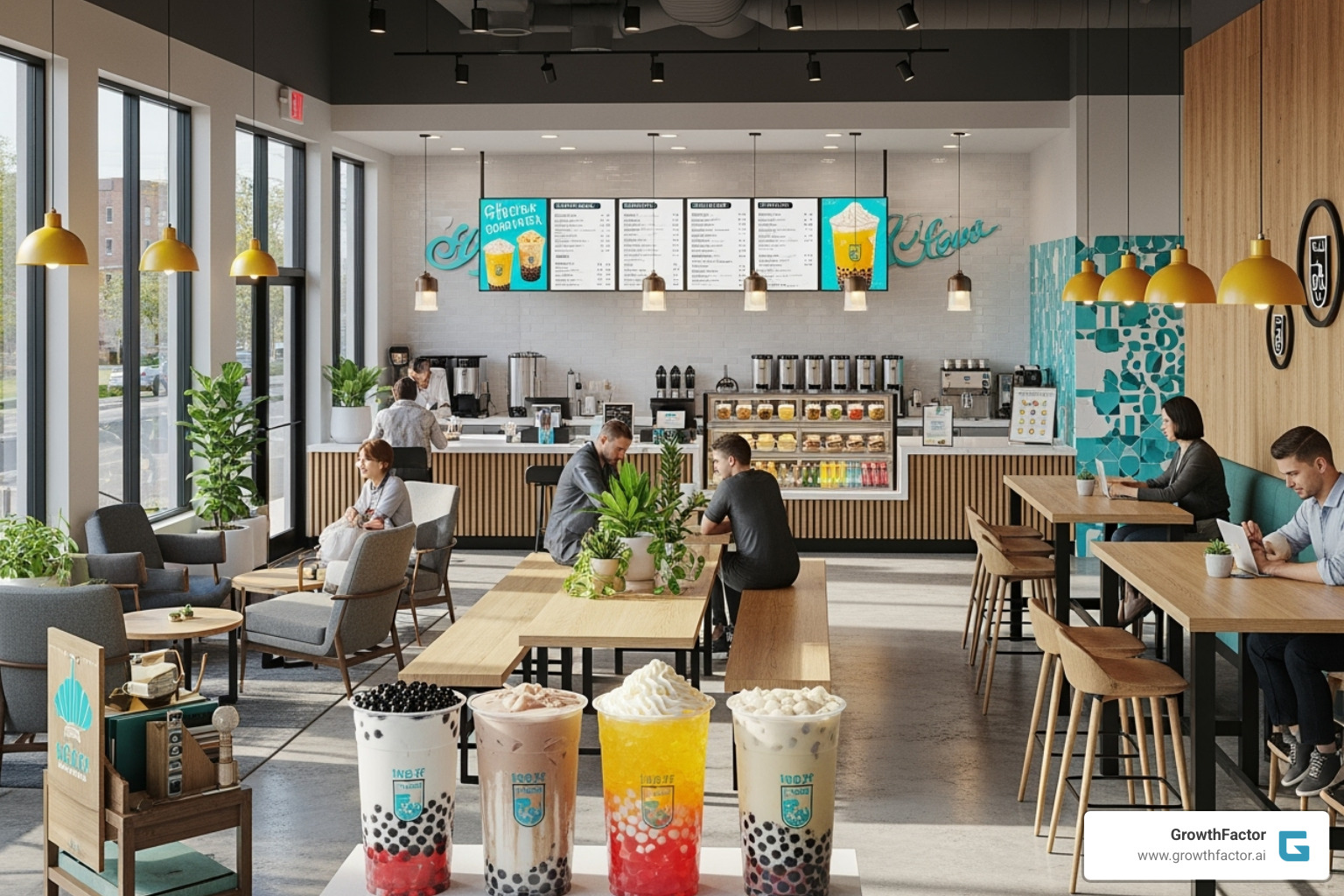
Tapioca Express is a pioneer, having opened the first boba tea store in the United States in 1999. With 47 franchise units, they cultivate a "spirit of Aloha" with a welcoming, friendly atmosphere. A key strength is their menu innovation, with monthly signature drinks and exclusive products.
Financially, Tapioca Express is an attractive opportunity. The initial investment is $200,000 to $527,000, but the franchise fee is just $15,000 and the royalty fee is only 2.5%—among the lowest in the industry. These lower ongoing costs can significantly boost profitability. They require $200,000 to $250,000 in liquid assets. Franchisees receive a 5 to 8 day hands-on training program and grand opening support. Learn more about this pioneering brand at Franchise Tapioca Express | Grab the opportunity..
8. It's Boba Time
With over 50 locations since 2003, It's Boba Time stands out in the boba tea franchise space with its extensive menu. Beyond classic milk and fruit teas, they offer smoothies, acai bowls, and coffee drinks. This diverse menu creates multiple revenue streams and attracts a wider audience throughout the day, smoothing out the sales peaks and valleys many single-focus shops experience.
Key Details:
The initial investment is between $389,100 and $531,700, with a $40,000 franchise fee. The ongoing royalty fee is 5% of gross sales, plus a 2% marketing fee for brand-wide advertising. The unique advantage is menu diversity, allowing franchisees to cater to various tastes—from health-conscious consumers to traditional boba fans—all under one roof. This flexibility turns the store into an all-day destination, maximizing its potential.
9. 7 Leaves Cafe
Founded in 2011, 7 Leaves Cafe offers a hybrid concept that blends artisanal coffee culture with premium tea, appealing to a broader customer base. The brand was built on values of honesty, humility, and understanding, creating community-focused spaces. With 20 franchise units, 7 Leaves prioritizes quality growth over rapid expansion. Their menu features unique drinks like Mung Bean Milk Tea alongside specialty coffee.
Key Details:
- Initial Investment: $200,000 - $450,000
- Franchise Fee: $35,000
- Royalty Fee: 5%
The investment range positions 7 Leaves in the mid-tier of boba franchise opportunities. The dual revenue stream from both coffee and boba can help stabilize revenue. 7 Leaves seeks franchisees who align with their mission of building a community gathering place, not just investors chasing a trend.
10. Onezo

Onezo's unique claim is being the world's first boba tea franchise to make tapioca pearls fresh in-house. This commitment to freshness creates a superior product and a theatrical customer experience. It also allows for unique creativity, with over 20 unique boba flavors, including themed options like "Pokemon" and "Panda."
The estimated total investment is around $180,000, including a $35,000 franchise fee, making it one of the more accessible options. A distinctive feature is the two weeks of intensive training at their headquarters in Taiwan, where franchisees learn the craft at its source. The franchise agreement is for five years and is renewable. Onezo also encourages creative revenue diversification, such as adding a K-Pop shop component to tap into an overlapping fan base.
Your Path to Ownership: Quick Application Overview
Owning a boba tea franchise follows a structured process to ensure brand fit and operational readiness. Most brands require proof of liquid capital (typically $100,000-$400,000) to cover startup and operating needs.
Typical steps:
- Initial inquiry via brand's form
- Financial qualification verification
- FDD review with franchise attorney
- Mutual fit interviews
- Site selection with real estate feasibility study
- Agreement signing and build-out
- Training and grand opening
What are the costs?Beyond the franchise fee ($15,000-$78,000), plan for total investment ($140,000-$530,000+) including build-out, equipment, inventory, and working capital. Ongoing costs include royalties (2.5%-7%) and marketing fees (1%-2%). Approach budgeting with disciplined financial decision making.
Training and supportInitial training ranges from days to weeks, with opening and ongoing operational support. Review the FDD and franchise agreement with an experienced franchise attorney before signing.
Your Path to Ownership: The Franchise Application Process
Starting your boba tea franchise journey means following a well-defined path that protects both you and the brand. The franchisor ensures you're set up for success, while you verify the opportunity aligns with your goals.
Financial qualification is the first hurdle. Sharetea requires minimum $100,000 in liquid capital, while Tastea looks for $400,000. These numbers reflect the reality of launching successfully, covering franchise fees, build-out costs, inventory, working capital, and unexpected expenses.
The application journey unfolds in eight stages. You'll start with an initial inquiry through the brand's franchise website. The franchisor will review your financial qualifications. Some brands like Tapioca Express charge a small fee ($25) for credit checks.
Once qualified, you'll receive the Franchise Disclosure Document (FDD). This essential legal document outlines all fees, obligations, franchisor history, and financial performance data. Have a franchise attorney review it thoroughly.
Next come interviews where the franchisor assesses your experience and brand alignment while you ask questions. Tastea conducts multiple interview stages to ensure mutual fit.
Then comes the critical site selection decision. Conducting a thorough real estate feasibility study ensures your chosen site has the demographics and foot traffic to thrive. At GrowthFactor, we've helped retailers analyze over 15,000 sites with a 99.8% success rate.
After securing an approved location, you'll sign the franchise agreement and negotiate your lease. Then comes store build-out and training according to brand standards while undergoing intensive training. Finally, you reach your grand opening.
What are the costs of a boba tea franchise?
Understanding the full financial picture is crucial before committing to a boba tea franchise. The initial franchise fee ranges from Tapioca Express's $15,000 to Chatime's $78,000. But this is just the beginning.
The total investment range encompasses everything—franchise fee, real estate improvements, equipment, inventory, signage, marketing, working capital, insurance, and professional fees. Ranges stretch from approximately $88,000 to over $500,000 for brands like It's Boba Time and Happy Lemon.
Ongoing fees include royalty fees (typically 2.5%-7% of gross sales) and marketing fees (1%-2%). Don't forget regular operational expenses: rent, utilities, wages, inventory, and equipment maintenance.
Understanding these requirements helps plan for sustainable success. Our insights into financial decision making help you think strategically about building a profitable business.
Training, Support, and Legal Considerations
A boba tea franchise provides comprehensive support structure—you're tapping into a proven system with experienced backing.
Training varies by brand. Kung Fu Tea runs two weeks at their KFT Academy. Onezo franchisees train for two weeks in Taiwan. Tastea combines two weeks of corporate training with four weeks of on-site support.
Most franchisors provide on-site opening support. Kung Fu Tea sends a Senior Trainer for two weeks post-opening. Tapioca Express provides 1-2 days of marketing support.
Ongoing support includes regular check-ins, operations manuals, troubleshooting help, marketing materials, and supply chain management.
The Franchise Disclosure Document (FDD) is required reading. Federal law mandates franchisors provide this document at least 14 days before you sign or pay anything. It covers 23 items including franchisor history, fees, obligations, territory rights, and financial performance information.
The franchise agreement is the binding contract outlining brand rights, territorial exclusivity, renewal options, and termination clauses. Have it reviewed by a franchise attorney.
Certain states including California, New York, and Illinois have additional franchise requirements. Your franchisor should guide you through compliance, but it's your responsibility to ensure everything is properly filed.
Keys to Success and Maximizing Your Return on Investment
Choosing a boba tea franchise offers significant advantages over starting an independent shop, including instant brand recognition and a proven business model. However, success isn't guaranteed. Key challenges include market saturation in some areas, fast-changing consumer trends, and franchisor dependency.
Your Return on Investment (ROI) depends on location, cost management, and local market conditions. While franchisors can't promise profits, their FDDs often provide financial performance data from existing units, offering a realistic baseline for your projections. For those considering multiple locations, a clear franchise growth strategy is essential.
Key success factors for your boba tea franchise
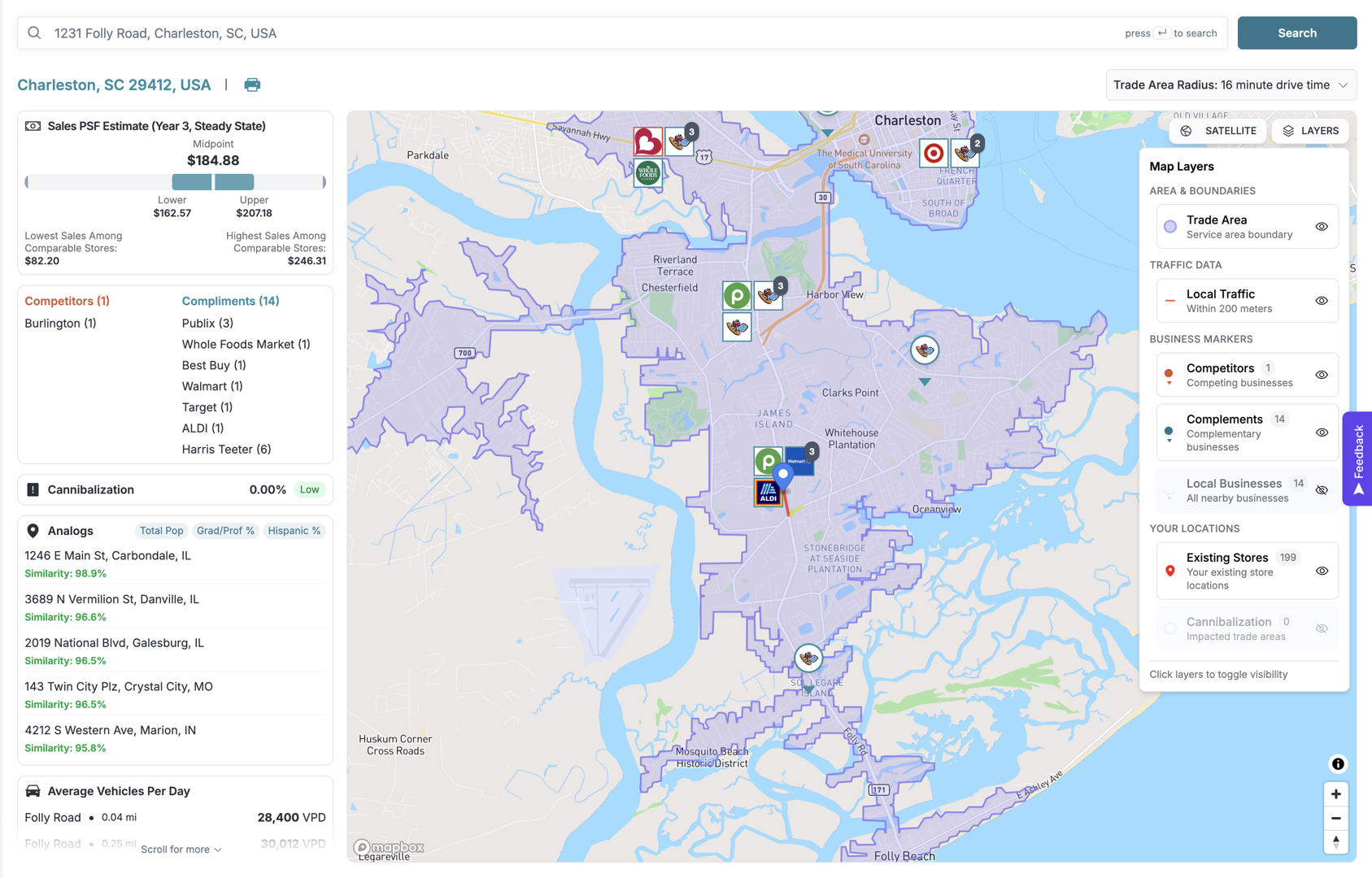
Success hinges on several critical factors:
- Location Selection: This is the single most important decision. Using tools for Foot Traffic Analytics and Site Demographics to find areas near colleges, shopping centers, and offices is paramount.
- Product Quality & Customer Service: Consistency is key. A great drink and a friendly team build loyalty and drive word-of-mouth marketing.
- Local Marketing & Community Engagement: Connect with your neighborhood through social media, local events, and partnerships to build a loyal customer base.
- Operational Efficiency: Streamlined processes ensure you can handle peak hours without sacrificing quality, keeping customers happy.
How different brands differentiate themselves
In a crowded market, brands stand out through:
- Product Innovation: Onezo's in-house boba and Happy Lemon's cheese foam topping are prime examples.
- Menu Diversity: It's Boba Time offers smoothies and acai bowls, while 7 Leaves Cafe blends in artisanal coffee.
- Branding and Aesthetic: Each brand cultivates a unique atmosphere, from Kung Fu Tea's "Fearless" vibe to Tapioca Express's "Aloha spirit."
- Technology: Tastea leads with kiosks and a loyalty app to improve convenience.Understanding these differentiators is crucial for choosing the right brand. Learn more about retail store optimization.
Frequently Asked Questions about Boba Tea Franchises
What is the typical return on investment for a boba tea franchise?
There is no single answer for ROI, as it depends heavily on factors like location, management, and local competition. The break-even timeline is often between one and three years. The best insight comes from the Financial Performance Representations (FPRs) in a brand's Franchise Disclosure Document (FDD), which show historical data from other locations. The importance of location cannot be overstated; a great site can significantly accelerate your path to profitability.
What are the biggest challenges of owning a boba tea franchise?
The primary challenges include:
- Fierce Competition: The market is popular, so standing out is crucial.
- Managing Fresh Ingredients: Balancing inventory of perishable items like fruit, milk, and fresh tapioca pearls requires careful management to minimize waste.
- Staffing: Finding, training, and retaining reliable staff in the food service industry is a constant effort.
- Keeping Up with Trends: The beverage industry evolves quickly, requiring adaptation to new flavors and customer demands.
- Ongoing Fees: Royalty and marketing fees are a constant expense that must be managed for profitability.
How do I choose the best location for my boba tea franchise?
Choosing the right location is the most critical decision. Start by identifying your target demographic—typically students and young professionals.
- Look for Proximity: Areas near colleges, high schools, shopping centers, and office districts are ideal.
- Prioritize Visibility and Accessibility: Your store must be easy to see and access, with adequate parking or public transit options.
- Analyze the Data: Don't rely on gut feeling. Use Retail Site Selection tools to analyze site demographics and high foot traffic patterns. Data can validate whether a location has the customer base to support your business.
- Assess the Competition: Understand the existing competitive landscape. Sometimes being near competitors creates a "boba district," while other times it's better to be the only option in an underserved area.
Conclusion: Brewing Your Future in the Boba Tea Industry
The boba tea franchise market is a thriving industry with significant growth potential. For entrepreneurs, franchising offers a path to enter this market with the support of a proven brand and operational system. However, success requires careful due diligence, a solid understanding of the financial commitments, and a strategic approach.
Of all the factors for success, one stands above the rest: location determines destiny. A great product in the wrong spot will struggle. This is where data-driven intelligence becomes essential. At GrowthFactor, our AI-powered platform removes the guesswork from site selection by analyzing foot traffic, demographics, and market dynamics to identify locations with the highest potential for success. We've helped retailers analyze over 15,000 sites with a 99.8% success rate.
Whether you're considering your first franchise or planning multi-unit growth, our Expert-backed retail expansion services provide the clarity needed to invest confidently.
Find out how GrowthFactor can help you identify the perfect location for your new franchise and build a foundation for sustainable success.
Citations
The human algorithm
Ready to see what we're cooking?
Submit your information below and we'll be in touch to schedule.




